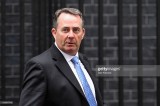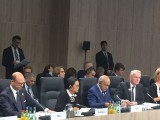Not an easy commitment to implement
At the recently concluded Munich Security Conference, the US has reassured other states that it will be unwavering in its commitment to the trans-Atlantic alliance and strongly support the North Atlantic Treaty Organisation (NATO), at the same time as it has sent a message expressing willingness to cooperate with Russia. In response, the European Union (EU) and Russia have delivered constructive words as well as affirmed their appreciation of their relationships with the US. However, it is not difficult to see that behind those commitments and messages, many differences and even disputes still remain.
One of the most common concerns at the conference was the US’s perspective and commitment in the relationship with Russia and the EU under President Donald Trump. Not long before the conference, the new US President expressed quite a negative opinion of the EU as he criticised the bloc over its immigration policy and called for NATO members to spend more on their defence budgets. The US President also said that Brexit would turn out to be a great thing and that other countries would follow Britain out of the EU. Amidst concerns of cracks in the US-EU relationship after these remarks, US Vice President Mike Pence brought a message of support for Europe from Donald Trump while Washington is also seeking a new direction for cooperation with Russia. Vice President Pence also repeated the support for the idea of a united Europe while he also underscored US calls for more defence spending in return.
Regarding relations with Russia, the US Vice President said that the US would continue to hold Russia accountable, even as it is searching for new common ground, which President Trump believes can be found. However, he also demanded that Russia honour the Minsk Agreements, beginning by de-escalating the violence in eastern Ukraine. After several times, the US President hinted at the possibility of warming up with Russia, VP Pence’s remarks somewhat helped visualise the potential for US-Russia relations.
Meanwhile, in the opposite direction, the viewpoints of the leaders of Germany and Russia in their speeches at the Munich security conference as well as other bilateral meetings showed that there are still many problems between the US, the EU and Russia. While US Vice President Mike Pence reaffirmed the US’s commitment to supporting NATO, German Chancellor Angela Merkel conceded that there was room for improvement in multilateral structures, including bolstering groups like the EU, NATO and the UN. It is also worth noting that contributions to NATO’s budget are likely to become a factor in internal discord among EU member countries. In fact, the conference saw different stances among the German leaders on this issue. German Chancellor Angela Merkel reiterated the European commitment to the NATO defense alliance, saying that Germany would do its best to reach the NATO-mandated defence spending target of 2% of gross domestic product (GDP). However, German Foreign Minister Sigmar Gabriel said that it would be hard to boost Germany’s defence budget quickly by the EUR25 billion (US$26.5 billion) that would be required. Germany now spends about 1.2% of its gross domestic product on its military. He called for a broader approach that also addressed security risks such as climate change and said Germany should get credit for the EUR30 to 40 billion it is spending to integrate over a million refugees, many of whom were displaced as a result of failed military interventions in the past.
Despite a few “winged words” on US-Russia ties by US leaders before and during the Munich Security Conference, it is still very difficult for the two sides to find a common voice and common interests, especially on Ukraine. Russia’s foreign minister Sergey Lavrov has called for a “post-West world order” while addressing global leaders at an international security conference. He accused NATO of being a Cold War institution and accused its “expansion” of sparking unprecedented tensions in Europe as both sides expand military deployments and drills. He said he hoped “responsible leaders” would choose to create a “just world order—if you want you can call it a post-West world order.”
The Munich Security Conference came to an end with many views on bilateral and multilateral cooperation and other hot issues given out. From the standpoint of the US, Russia, the EU at the conference, it can be seen that despite interest in cooperation, the parties have yet to resolve disagreements on many issues of regional and international import. Accordingly, the commitments made at this conference will not be easy to keep and the already complicated US-EU and US-Russia relations will continue to face many challenges.
NDO
- Indonesia’s Ruang volcano erupts, hundreds evacuated (18/04)
- Japan’s 2024 Diplomatic Bluebook sketches out cooperation orientation with ASEAN (18/04)
- Philippines seizes 1.8 tonnes of meth in record drug bust (17/04)
- Thailand looks towards cashless society (15/04)
- The strategic alliance relationship (13/04)
- Singapore keeps monetary policy unchanged (13/04)
- Lao economy forecast to grow 4% in 2024, 2025: ADB (12/04)
- IMO Secretary General: Attacks in Red Sea pose serious threats to global maritime security and trade (08/04)
 Indonesia’s Ruang volcano erupts, hundreds evacuated
Indonesia’s Ruang volcano erupts, hundreds evacuated
 Thailand looks towards cashless society
Thailand looks towards cashless society
 Singapore keeps monetary policy unchanged
Singapore keeps monetary policy unchanged
 The strategic alliance relationship
The strategic alliance relationship
 Lao economy forecast to grow 4% in 2024, 2025: ADB
Lao economy forecast to grow 4% in 2024, 2025: ADB
 IMO Secretary General: Attacks in Red Sea pose serious threats to global maritime security and trade
IMO Secretary General: Attacks in Red Sea pose serious threats to global maritime security and trade
 Vietnam condemns attack on Iranian embassy in Syria
Vietnam condemns attack on Iranian embassy in Syria
 Indonesia strives to control domestic rice prices
Indonesia strives to control domestic rice prices
 Phnom Penh authorities ensure social order for Chol Chnam Thmey
Phnom Penh authorities ensure social order for Chol Chnam Thmey
 Heavy task in new term
Heavy task in new term



